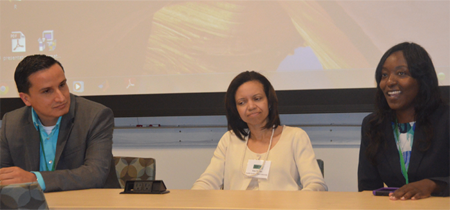Recruiting Workshop Allows for Discussion of Best Practices
Katherine Kantner, SAMSI and NISS, and Snehalata Huzurbazar, SAMSI

Pedro Torres-Saavedra, Kim Weems, and Kyndra Middleton serve as members of a panel. (Photograph by Donald Cole)
Recruiting and Retaining Graduate Students in the Statistical Sciences and Applied Mathematics” was the title of an interactive workshop June 5–6 at the Statistical and Applied Mathematical Sciences Institute (SAMSI) in Research Triangle Park, North Carolina.
The workshop was organized in conjunction with the National Alliance for Doctoral Studies in the Mathematical Sciences with the goal, as stated by Alliance Director Phil Kutzko, to increase the number of students in doctoral programs in the mathematical sciences from “families, regions, and ethnic backgrounds that have had little prior contact with the profession and culture of the mathematical sciences.” SAMSI supported this workshop as part of its effort to help increase diversity in the statistical and mathematical sciences.
Alliance members Kutzko, Kathryn Chaloner, Leslie McClure, and Kim Weems, along with SAMSI Deputy Director Snehalata Huzurbazar, organized the event. The SAMSI workshop had 12 participants from four universities. Three other alliance members helped as facilitators.
The working goals, as described by Weems from North Carolina State University, were to share current best practices for broadening access for and enhancing the success of U.S. students, especially of women and members of under-represented minority groups (URM), and to formulate new strategies. She emphasized that thinking outside the box and being open to new and bold ideas were important; participants were expected to leave with a plan for their departments.
The first day started with an introduction to the alliance by Kutzko. The Math Alliance started in 2001 as a partnership between a handful of mentors from three doctoral-granting universities in Iowa and four historically black colleges and universities. It is organized as a community of mentors and students. Over the years, the alliance has evolved in structure and membership to include more than 400 faculty mentors from pre-doctoral and doctoral departments representing 154 institutions. The pre-doctoral mentors teach at undergraduate colleges and universities with significant percentages of students from under-represented minority groups (URMs). There have been more than 1,000 pre-doctoral students, and there are 26 math sciences doctoral-granting departments that form the alliance’s graduate program groups. The alliance builds community with partnerships between the pre-doctoral and doctoral mentors committed to mentoring and training students from URMs, thus enhancing the possibilities for the students’ academic and professional success.
Until recently, alliance members were primarily from mathematics departments; however, under the statistics initiative of the alliance led by Kathryn Chaloner, Leslie McClure, and others, the expansion to statistics and biostatistics departments is taking place. In her talk, Chaloner contrasted the demographics of PhDs in mathematics with those in statistics and biostatistics departments. From 1995–2009, math departments awarded 50%–60% to U.S. citizens. The percentage in statistics was lower at 28%–55%, and 45%–75% in biostatistics. Among the U.S. citizens, the percentages of PhDs awarded to URMs are drastically low, with the 2009 numbers around 8% in math and biostatistics and 4% in statistics.
The audience next heard from Weems, Kyndra Middleton, and Pedro Torres-Saavedra. They discussed their experiences transitioning from a minority undergraduate institution to a majority research institution. They stressed how important mentoring was to their success and described different aspects of the cultural differences they encountered. Ensuring success sometimes meant making up weak courses from their undergraduate education, but this was possible because they were given good advice and mentoring.
In the next panel, experienced alliance mentors Kutzko, McClure, and Donald Cole discussed best practices for mentoring. Important points made were that a mentor is different from an advisor and mentoring, though time consuming, is important for all students. It was noted that mentoring comes naturally to some, but successful mentors can be trained. Mentors can be instrumental in helping students, especially those from URMs, feel comfortable in the culture of academia, and this helps students make progress in their programs. Peer mentoring, where a senior graduate student is paired with an incoming graduate student also was discussed as a successful strategy. Panel members also pointed out that mentors, whether faculty members or peers, help students understand and deal with underlying cultural issues and differences, and this has proved to be key to student success in various departments.
The remainder of the day was spent with team members and facilitators formulating plans for the teams’ departments. The following morning, the teams presented their plans with much discussion and input from other teams and alliance mentors. The workshop ended with a motivating talk by Kutzko about changing the culture in the mathematical sciences to create a new culture, more reflective of the composition of the United States in 2014.
Overall, the participants were impressed with what they learned and with the networking opportunities the workshop presented. The atmosphere was casual, and though the day and a half was intense, it resulted in focused discussion of common problems encountered in different departments.
For more information about the workshop, visit the SAMSI website.

















